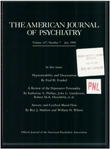DSM-III and DSM-III-R diagnoses of autism
Abstract
The authors examined the reliability, sensitivity, and specificity of DSM-III and DSM-III-R criteria for autism in relation to each other and to clinical diagnoses in 114 children and adults (52 diagnosed by clinicians' best judgment as autistic and 62 as nonautistic but developmentally disordered). They used a standard, structured coding scheme to evaluate each patient. The reliability of specific criteria was generally high. Although DSM-III criteria were highly specific, they were less sensitive; the reverse was true for DSM-III-R. The authors conclude that the diagnostic concept of autism in DSM-III-R appears to have been substantially broadened.
Access content
To read the fulltext, please use one of the options below to sign in or purchase access.- Personal login
- Institutional Login
- Sign in via OpenAthens
- Register for access
-
Please login/register if you wish to pair your device and check access availability.
Not a subscriber?
PsychiatryOnline subscription options offer access to the DSM-5 library, books, journals, CME, and patient resources. This all-in-one virtual library provides psychiatrists and mental health professionals with key resources for diagnosis, treatment, research, and professional development.
Need more help? PsychiatryOnline Customer Service may be reached by emailing [email protected] or by calling 800-368-5777 (in the U.S.) or 703-907-7322 (outside the U.S.).



